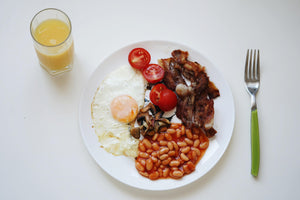The most typical food allergy in infants is a reaction to cow's milk protein (CMPA). CMPA arises whenever the body's immunological system responds improperly to a protein found in the cow as well as other animal milk. Babies under the age of one are typically affected by it.
Our bodies are typically guarded against hazardous organisms like viruses and bacteria by the immune system. When someone has CMPA, their immune system assaults a protein found in cow's milk because it thinks it's a dangerous chemical. The baby's intestines and stomach may become injured as a result of this immunological response.
Formula milk vs cow milk
Formula milk is designed to replace breast milk, thus it has been modified to be as comparable to breast milk as is reasonably possible, with the right balance of healthy fats, vitamins, and proteins. Since most infants are unable to tolerate cow's milk's high protein content, formula milk has lower protein contents. Cow's milk is also developed to be easier to digest because your child's tiny stomach can find it difficult to absorb sufficient nutrients from it.
Causes
True food allergies are all brought on by immune system problems. When you develop a milk allergy, your immunity system perceives particular milk proteins as dangerous and produces immunoglobulin E (IgE) antibodies to bind to the protein and neutralise it (allergen). IgE antibodies detect these proteins the second time you are exposed to them, alerting your immunological system to emit histamine as well as other chemicals and leading to a variety of allergy symptoms and reactions.
What protein causes cows to have a milk allergy?
-
Casein, a substance present in the curdled milk's solid portion
-
Whey is a liquid component of milk that is left behind when milk curdles
Either or both milk proteins may cause an allergic reaction in you or your kid. Given that some processed meals contain these proteins as well, it could be difficult to avoid them. Additionally, the vast majority of individuals who have an adverse reaction to cow's milk also have an adverse reaction to goat, sheep, as well as buffalo milk.
What Symptoms and Signs Indicate a Milk Allergy?
Children who experience symptoms soon after consuming milk may experience an allergic reaction that results in:
-
Difficulty breathing
-
Wheezing
-
Coughing
-
Uncomfortable stomach
-
Constricted throat
-
Diarrhoea
-
Vomiting
-
Puffy, watery, or itching eyes
-
Swollen a reduction in blood pressure that results in dizziness or unconsciousness
There is a wide range in the severity of milk allergies. Even the same child may respond differently each time. This implies that even if one response was minor, the following one might be more serious or even fatal.
Children may also experience:
-
Milk intolerance in which signs, like loose faeces, bleeding in the faeces, unwillingness to eat, restlessness, or colic, take hours to days to manifest.
-
Lactose intolerance is a condition in which the body has difficulty processing milk.
Consult your doctor if you're unsure whether your youngster has a sensitivity or an intolerance.
How can children who have a cow's milk protein allergy be treated early on?
Eliminating cow's milk protein from your kid's diet is a part of treating CMPA. Starting an elimination diet with hydrolyzed formulations, which are typically easier to digest without triggering an immune response, is standard practice.
In roughly 90 per cent of kids with CMPA, these formulas are effective. It is required to utilise formulae containing the various protein-building components in some youngsters.
A drug termed epinephrine is an essential component of treatment for an acute reaction to CMPA that results in anaphylaxis, a significant allergic reaction characterised by swelling, hives, reduced blood pressure, and, in extreme cases, shock. Even if epinephrine relieves the signs, patients with anaphylaxis have to be assessed and watched in a hospital emergency department. This is due to the possibility that a subsequent wave of symptoms could appear after the epinephrine goes off.
If the mother chooses to continue breastfeeding her child who has CMPA, she must cut out all soy and dairy products from her diet because these proteins may be transferred to the child through breast milk. Although a nutritionist may assist in locating obscure sources of soy and dairy in the diet, this might be challenging.
It is unlikely that using sheep's or goat's milk as a replacement can alleviate symptoms because this milk often has the same effect as cow's milk. Additionally, soy milk is typically not advised. The proteins within these milk or formula made from soy will cause comparable allergic reactions in a lot of infants.






